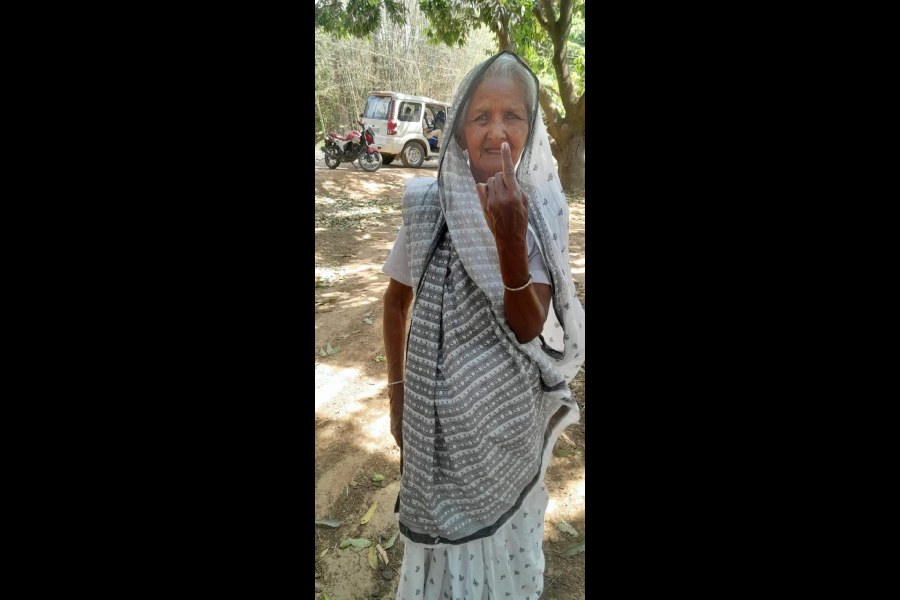Sajmu Nisha Sajoman was desperate to vote. But the ninety-something grandmother, who had voted in every general election since the first in 1952, had a problem.
She could not remember where her home was.
Sajoman had disappeared on April 16 from Mumbai’s Victoria Terminus station, from where she was to catch a train back home to Bihar along with her son.
Bengal police found her lying unconscious on a road near Howrah station the following day and took her to hospital. But all she could tell the doctors was her name, a place name that is pretty common in many parts of the country, and how keen she was to vote.
The elderly woman had travelled to Mumbai to visit her grandson but wanted to return home well in time to vote in the second phase of the general election on April 26.
“I accompanied her and my father to Victoria Terminus to see them off. As we were waiting for the train on a crowded platform, she suddenly disappeared,” Sajoman’s grandson, Mohammed Jahid Raja, 32, said.
“We filed a missing persons complaint in Mumbai but she remained untraceable. We visited the police station several times but the cops had no clue. We had given up hope of finding her, but things changed after we received a call from the Bengal police.”
Bengal cops had taken Sajoman to Howrah State General Hospital where she was admitted for treatment.
“She was aged and seemed to have collapsed from dehydration triggered by the intense heat. She was well-dressed and had money in her purse. We thought she might be from a neighbouring locality,” a police officer from Golabari police station in Howrah said.
“She kept uttering two words — ‘chunao (election)’ and ‘Sultanpur’. At first, we thought she belonged to Sultanpur district of Uttar Pradesh,” Golabari inspector-in-charge Sudip Sinha said.
“We got in touch with our counterparts in Sultanpur, but the search did not lead
anywhere.”
The Howrah police commissionerate got in touch with the West Bengal Radio Club, an organisation of public-spirited ham radio enthusiasts who had earlier helped the police trace missing people by activating their counterparts elsewhere in the country.
“She seemed to be speaking a dialect typical of Bihar; so we sent her photograph
and voice recordings to our Bihar counterparts,” Radio Club secretary Ambarish Nag Biswas said. “We learnt there was a Sultanpur village in Banka district.”
Bihar, however, has multiple villages named Sultanpur.
“They (ham radio enthusiasts in Bihar) told us that Sajoman’s accent was similar to that spoken in Banka district. So, they shared her picture with the panchayat heads of Sultanpur and nearby villages in Banka,” Biswas explained.
“A mukhiya identified Sajoman from the picture and helped us get in touch with her family.”
The Bihar police too were contacted. Sajoman’s grandson Raja, who lives in Mumbai, officially identified her. He arrived in Howrah on April 21 to take his grandmother back home, well in time for the April 26 vote.
“Hamara muhalla me ye akhri vote hai (This is the last election in our locality). Main vote dena chahti hun (I want to vote),” Sajoman had kept telling the doctors and the nurses since recovering consciousness on April 17.
Raja explained: “For the past 72 years she has been voting at her local polling station. However, a new school building is being built nearby, and the polling station will be relocated there from the next election onwards.”
He expressed his gratitude to Bengal police. “I’m relieved that she can return home before polling day,” Raja said as he led a frail but happy Sajoman out of the hospital.
On the morning of April 26, Sajoman accompanied her son, Md Junaid, 56, and other family members to UMS Sultanpur Urdu School and cast her vote to elect a representative for the Banka parliamentary constituency.
“This could be my last vote. I’m thankful to God that I could vote,” an elated Sajoman told this newspaper over the phone.
She thanked the police and the “radio service people” for reuniting her with her family and making it possible for her to vote.











